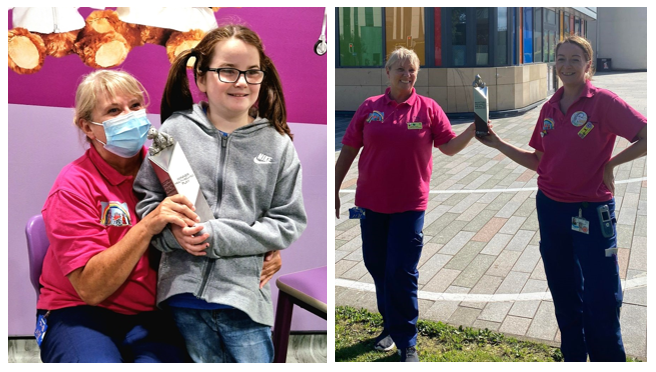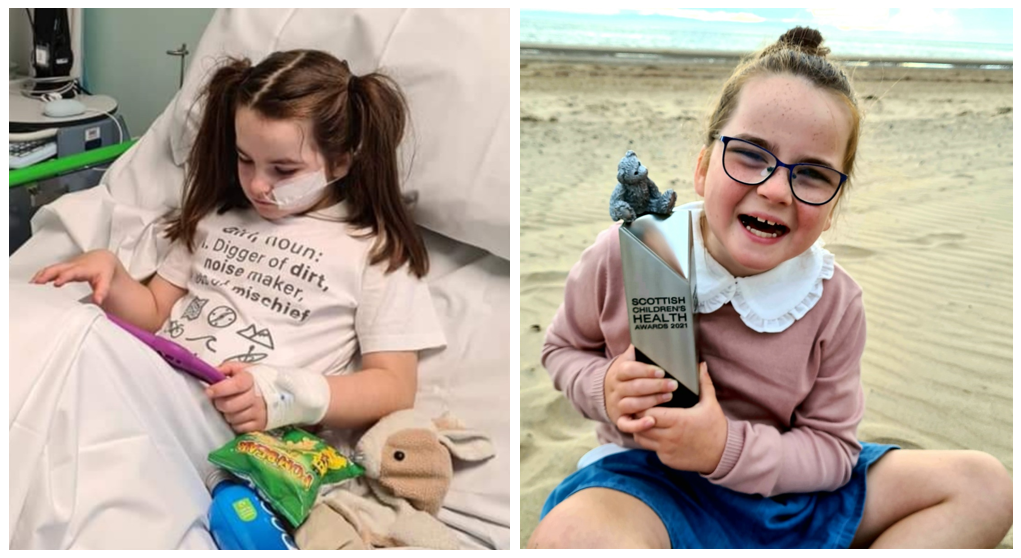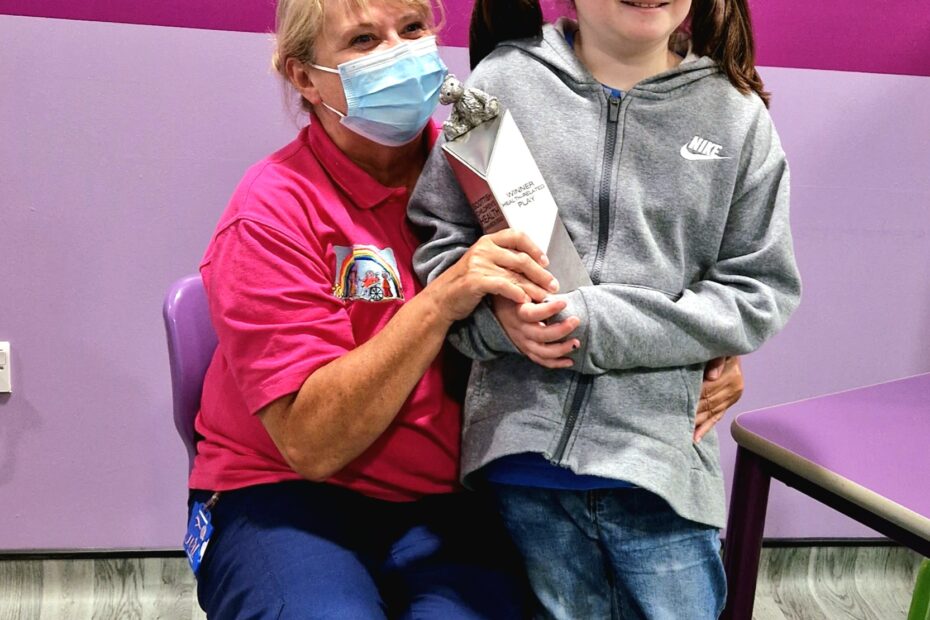
The mother of a patient at the Royal Hospital for Children in Glasgow has praised the incredible impact the Play Team have had on her daughter.
Since birth, Emily Donn displayed issues with feeding and has been in and out of hospital for appointments with gastroenterology and urology consultants, surgeons and specialist nurse teams for bowel and bladder.
Emily’s symptoms have resulted in several hospital stays, tests, scans, theatre visits, procedures and treatments over the years, which have led to high levels of anxiety and stress at times.
However, while it’s been a lot to take on physically and emotionally, the RHC’s Play Team have played a key role in helping Emily, who is now eight, to learn more about complex medical procedures while helping to ease her concerns and comfort her.
Emily’s mum Julie said: “Emily first met the play team when she was four and interactions with them have been the key to the success of most of the things that Emily has been able to achieve. When she first came to the hospital she was very nervous about what the experience would be like and was a bit scared of what would happen.
How have the play team changed Emily’s life?
“The Play Team have seen her through so many procedures. We use them both before appointments for preparation and after to allow her a pressure-free space to relax. I’m also so grateful for the support they have given myself. They talk me through different ways I can help Emily and help me to think outside the box when things are tough. They are also so incredibly easy to talk to and can make the most difficult days better just by listening and chatting. Sometimes I need the support as much as Emily and they are always there to help.
“They have also worked with Emily’s sister on occasions when she has been at the hospital with her to ensure she doesn’t feel left out and that she understands what is happening with Emily as well.”
When people hear the term ‘Play Team’ they may think of a service that gives children the chance to have fun while they spend time in hospital. And while the team build great relationships and encourage learning through play, they do so much more.
Over the years, Emily, who is from Lochwinnoch, Renfrewshire, has worked closely with the Play Team, but has a particular bond with Teri Wright, who is one of the Health Play Specialists at the RHC. Whether it’s listening to her concerns, playing games or explaining procedures in an interactive way at the site’s Teddy Hospital, which is the only one of its kind in Scotland, Teri has always been able to find a connection with Emily.
Last month, Teri and her colleague Wendy McKechnie, who is a Play Assistant, were recognised by the Children’s Health Scotland Awards for their amazing work, with Teri finding out after the event that Emily nominated her.
Julie added: “Teri has helped Emily through some of the most challenging times, she can tell if she is having an off day and is really attentive to her interests and knows how to get her engaging. The impact was so clear during COVID-19 – I think that time really highlighted the importance of the team. You could really see Teri’s smile behind the mask which was so important in keeping Emily positive and interested. Despite the masks Teri’s friendly face was still shining through keeping fun and familiarity as the focus at an otherwise really uncertain time.
“Teri also nominated Emily for a young achievers award at the same awards last year, so when she found out she could put Teri forward she was desperate to do it. We can’t thank Teri and the team enough for what they have done and continue to do for us.”

What is National Play in Hospital Week?
From October 10 until October 14, Play Teams across the country are celebrated as part of National Play In Hospital Week for the work they do with children like Emily and the positive impact they have on their mental health wellbeing and recovery.
Teri said: “It was excellent to hear that we had been nominated by Emily. I have worked with her for a long, long time and she has had a very hard time of it. She is still attending here and we have such a great relationship.
“I nominated her for the young achievers previously because she had gone through so much and still continued to get on with things as best she possibly could. It affects the whole family when a child is unwell, it impacts on everything, their mental health, their schooling, their social life.
“In this job, for me, when you can see a child engage with our approach and you see the fear and anxiety is removed, that’s the most rewarding thing. When a parent comes up and thanks you or a patient comes back and recognises you years on for the work you’d done for their family, that’s when you know you’re helping to make a difference.
“I’m not a nurse, but I am there to support the children and their families at what can be a hugely stressful time. I think they see us as a friend. What we do is all play based, at the Teddy Hospital we explain what will happen through role play, with a teddy or doll, and we take them on visits to meet the staff and learn about procedures we do as many sessions as needed to help with their nerves and anxiety.”
Mandy Meechan, Interim Chief Nurse for NHS Greater Glasgow and Clyde, said: “We are all so proud of Teri, Wendy and our entire Play Team at the Royal Hospital for Children who do such an amazing job to support the children in our care and their families.
“You can see how strong a connection they have with the patients they work with on a daily basis. The role of play in helping children understand procedures and treatment, which helps to ease worries and anxieties they may have, cannot be understated. Congratulations on your much deserved recent award.”
Who are the Royal Hospital for Children’s Charity?
The work of the RHC’s Play Team, and the site’s Teddy Hospital also receives support from the Glasgow Children’s Hospital Charity, who have witnessed the impact of play on patients and their families.
Kirsten Watson, the charity’s CEO, said: “We have proudly supported the hospital’s play programme for more than 20 years, and believe it to be an indispensable part of a child’s hospital journey. Last year we invested more than £519,000 in play services, funding play staff, specialist equipment and fun events to relieve anxiety, support mental health and give children a positive experience in hospital.
“We are incredibly grateful to our donors and fundraisers for raising the vital funds that enable us to provide a structured play programme, which aims to give every child in hospital the chance to play.”

ENDS

